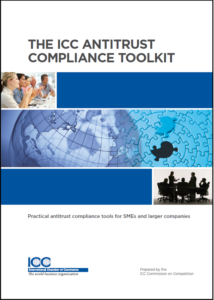
ICC unveils Antitrust Compliance Toolkit
The International Chamber of Commerce (ICC) today launched the ICC Antitrust Compliance Toolkit, a practical tool for both small- and medium-sized enterprises and larger companies.

The ICC Commission on Competition presented the toolkit during the 5th ICC Roundtable on Competition Policy being held on the sidelines of the annual International Competition Network (ICN) conference in Warsaw.
Produced by the ICC Task Force on Antitrust Compliance and Advocacy, the toolkit is a practical response to suggestions by the Office of Fair Trading of the United Kingdom, the Directorate General for Competition of the European Commission and other antitrust agencies. Designed for companies of all sizes wishing to build or reinforce a robust antitrust compliance programme, it seeks to complement materials produced by antitrust agencies and other sources of guidance, by focusing on practical steps companies can take internally to embed a successful compliance culture.
Anne Riley, Chair of the ICC Task Force on Antitrust Compliance and Advocacy and Group Antitrust Counsel at Shell, presented the tool. “The toolkit is designed by business for business and reflects contributions from antitrust specialists closely associated with in-house compliance efforts around the world. It is hoped that it will assist companies from all sectors and of all sizes, including small- and medium-sized companies (SMEs) to establish an antitrust compliance programme suited to their needs, risk profile and resources,” she said.
The toolkit is arranged into 11 chapters covering the following topics:
1. Compliance embedded as company culture and policy
2. Compliance organization and resources
3. Risk identification and assessment
4. Antitrust compliance know-how
5. Antitrust concerns-handling systems
6. Handling of internal investigations
7. Disciplinary actions
8. Antitrust due diligence
9. Antitrust compliance certification
10. Compliance incentives
11. Monitoring and continuous improvement
The toolkit does not delve into the complexity of the laws in each jurisdiction, but sets out a pragmatic approach to antitrust compliance – with practical tips and issues to consider – that companies can use globally in any country, whether a jurisdiction has sophisticated or less sophisticated antitrust laws. In doing so, ICC seeks to contribute to the establishment of consistently high global standards for antitrust compliance that assist companies and, as a consequence, stimulate trade and investment.
The ICC Commission on Competition ensures that modern business needs and the realities of global markets are taken into account in the formulation and implementation of competition laws and policies. The commission currently has over 300 members, comprising experts on competition law, legal advisors from industrial and commercial enterprises, and private practice lawyers from 40 countries.
Over the past decade the ICC Commission on Competition has gained recognition as the voice of the international business community at the ICN, the main international organization devoted exclusively to competition law enforcement. Each year, on the occasion of the ICN annual conference, ICC organizes a complementary roundtable on cutting-edge competition issues, facilitating the dialogue among business and senior competition agency officials and providing business expertise and experience in areas of competition policy implementation, due process, innovation policy, unilateral conduct and antitrust compliance.
This year’s event entitled “Improving Antitrust Compliance and Looking East” will mark the launch of the ICC Antitrust Compliance Toolkit and look at challenges to antitrust policies in Eastern Europe.
Over recent years, legal and compliance requirements, affecting companies large and small, have steeply increased worldwide. Managing the steady growth of these compliance requirements creates increasing challenges to business. By promoting open international trade and investment across frontiers and helping businesses meet the demands and opportunities of globalization, ICC seeks to play a key role in assisting a growing understanding between business and antitrust agencies in relation to antitrust compliance, and is uniquely positioned to do so.
Find out more about the ICC Antitrust Compliance Toolkit
For more information visit the ICC Commission on Competition

